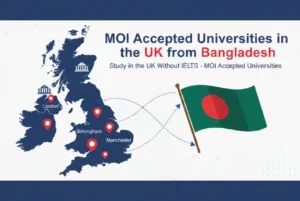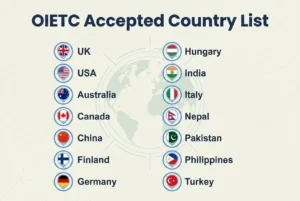Studying in Europe without IELTS is possible through TOEFL, PTE Academic, CAE, CPE, Duolingo English Test, or MOI, depending on university requirements.
Many international students want to study in Europe, but the IELTS exam often becomes a major barrier.
Preparing for IELTS requires extra time, costly coaching, and repeated exam fees. A low score can delay admission and reduce the chance of getting into top European universities. For many students, this creates unnecessary stress and financial pressure.
The good news is you can study in Europe without IELTS. Many European universities now accept alternatives such as TOEFL, PTE Academic, Duolingo English Test, CAE, CPE, or even a Medium of Instruction (MOI) certificate. This makes the admission process easier, more affordable, and more accessible for international students.
Advantages of Studying Without IELTS
Saving money on exam fees, reducing preparation stress, simplifying the application process, and broadening university options are the best advantages of studying in Europe without IELTS.
Saving Money on Exam Fees
IELTS and other English tests cost a lot, and retakes add more expense. Studying in Europe without IELTS helps students avoid these extra costs.
Reducing Preparation Stress
Preparing for IELTS requires months of practice, coaching, and mock tests. Without this requirement, students can focus on their admission and future studies.
Simplifying the Application Process
Skipping IELTS makes applications faster and easier. Students only need alternative proofs like TOEFL, PTE, Duolingo, or MOI to complete admission.
Broadening University Options
Many European universities now accept students without IELTS, which increases choices and opportunities for international students.
Also Read: How to Study Abroad Without IELTS
Top Programs and Fields for Non-IELTS Admissions
Business, engineering, medicine, and dentistry are top programs and fields to study in Europe without IELTS. It depends on university and country choice.
Business
Europe offers top business programs with a focus on management, finance, marketing, and international trade. Graduates get wide global career opportunities.
Engineering
European universities are famous for mechanical, civil, electrical, and computer engineering. Students learn with advanced labs and industry exposure.
Medicine
Medical schools in Europe provide globally accepted degrees with strong clinical training. Students gain hands-on hospital experience during study.
Dentistry
Dentistry programs focus on modern dental care, oral health research, and clinical practice. Graduates can work worldwide with recognized qualifications.
Requirements to Study in Europe Without IELTS (Alternatives to IELTS)
To study in Europe without IELTS, students can take any alternative English proficiency tests such as TOEFL (Test of English as a Foreign Language), PTE Academic (Pearson Test of English), MOI (Medium of Instruction), Duolingo English Test, Cambridge English Qualifications, TOEIC (Test of English for International Communication), and local or university-specific English tests.
Let’s find out the details:
TOEFL (Test of English as a Foreign Language)
TOEFL is one of the most accepted alternatives to IELTS in Europe. You can register online and take the test either at a test center or online (TOEFL iBT). Most European universities require a score between 80 and 100. The cost usually ranges from $180 to $250, depending on the country.
PTE Academic (Pearson Test of English)
PTE Academic is a computer-based test widely accepted across Europe. Registration is done online, and the test is available year-round. Universities generally ask for a score between 50 and 65. The test fee is around $170 to $220.
MOI (Medium of Instruction)
Many European universities accept an MOI certificate from your previous institution if your education was in English. You can get it from your school’s or university’s registrar. No extra cost is involved, but acceptance depends on the university policy.
Duolingo English Test
The Duolingo test is fully online and can be taken from home. It’s affordable, and results are available within 48 hours. European universities usually require a score of 95–120. The test costs around $70.
Cambridge English Qualifications
Cambridge exams (like C1 Advanced or C2 Proficiency) are also recognized in Europe. You can take them through authorized centers. Universities generally ask for C1 or higher. The cost ranges from $150 to $250, depending on the exam level.
TOEIC (Test of English for International Communication)
TOEIC is less common but still accepted by some European universities. You can register through local centers. Universities usually require 700+ scores. The cost is around $120 to $150.
Local or University-Specific English Tests
Some universities offer their own English tests as an alternative to IELTS. These are usually online or on-campus assessments. Score requirements vary by institution. Costs are often lower than international exams or sometimes even free for applicants.
Other Accepted Qualifications (A-Levels, IB, etc.)
Many European universities also accept international qualifications like A-Levels, International Baccalaureate (IB), or equivalent high school diplomas. If these programs were studied in English, they could serve as proof of language proficiency. You simply need to submit your official transcripts and certificates during application. No extra cost is required, and score requirements depend on the specific university and program.
Top 10 European Countries to Study Without IELTS in 2025
The United Kingdom, Germany, France, Sweden, Denmark, Belgium, Spain, and Malta, are the most demanding countries to study in Europe without IELTS. As an alternative to IELTS, you can demonstrate skills like TOEFL, PTE Academic, and MOI in these countries.
United Kingdom (UK)
The United Kingdom (UK) is one of the most popular study destinations in Europe, known for world-class universities like Oxford, Cambridge, and Imperial College. It offers strong career prospects, globally recognized degrees, and diverse academic programs. Many universities accept alternatives to IELTS, such as MOI, TOEFL, or Duolingo, making it easier for international students to apply.
Also Read: How to Study in the UK without IELTS
Germany
Germany is famous for its high-quality education and tuition-free or low-cost public universities. The country is especially strong in engineering, technology, and research. Many German universities accept MOI or other English proficiency tests instead of IELTS, which helps reduce barriers for international students.
France
France offers globally recognized degrees, rich cultural experiences, and opportunities to study in both English and French. Business, fashion, arts, and engineering are popular fields here. Many universities accept MOI or alternatives like TOEFL and Duolingo, which makes the application process more flexible.
Sweden
Sweden is known for its innovative education system, modern learning environments, and strong focus on research and sustainability. Many programs are taught in English, and universities accept various alternatives to IELTS. The country also offers numerous scholarships to international students.
Denmark
Denmark provides high-quality education with an emphasis on creativity, problem-solving, and real-world application. Many bachelor’s and master’s programs are available in English. Several universities accept MOI or other English tests, which allows students to study without IELTS.
Also Read: How to Study in the UK without IELTS
Italy
Italy is a top choice for international students, offering a mix of high-quality education and rich cultural heritage. It is especially popular for programs in art, architecture, fashion, design, and history, as well as medicine and engineering. Many Italian universities provide English-taught programs and accept alternatives to IELTS, such as MOI, TOEFL, or Duolingo. Affordable tuition fees, scholarship opportunities, and a vibrant lifestyle make Italy an attractive destination for students.
Spain
Spain is popular for its affordable education, rich culture, and growing number of English-taught programs. It is strong in fields like business, medicine, and humanities. Many universities allow students to study without IELTS if they can provide MOI or take university-specific tests.
Malta
Malta is an English-speaking country with a warm climate and affordable cost of living. It offers recognized degrees and is especially strong in business, tourism, and IT. Since English is widely spoken, universities often accept MOI or waive IELTS requirements.
Also Read: How to Study in Malta Without IELTS
Poland
Poland is one of the most affordable study destinations in Europe with rapidly growing universities. It is strong in medicine, engineering, and business. Many universities accept MOI, TOEFL, or other English proficiency tests instead of IELTS, making it a student-friendly option.
Also Read: How to Study in Poland without IELTS
No IELTS Required Universities in Europe
Ulster University in the UK, Ardennes University Berlin in Germany, Paris School of Business in France, University West in Sweden, IBA in Denmark, Bologna University in Italy, Ascensia Valencia in Spain, Ascensia Malta in Malta, and Warsaw University of Business in Poland are top choice universities to study in Europe without IELTS. Below are some other top universities:
United Kingdom (UK)
Best universities in the UK where IELTS is not required:
- Northumbria University Newcastle
- Ulster University
- University of South Wales
- Solent University
- Oxford Brookes University
- Coventry University
- Cardiff Metropolitan University
- Bangor University
Germany
Best universities in Germany where IELTS is not required:
- Arden University Berlin
- International University of Applied Sciences
- University of Kent
France
Best universities in France where IELTS is not required:
- Paris School of Business
- EBS Paris
- EPITA – School of Engineering and Computer Science
- Esaip Engineer School
Sweden
Best universities in Sweden where IELTS is not required:
- University West
- Uppsala University
- Stockholm University
Denmark
Best universities in Denmark where IELTS is not required:
- International Business Academy (IBA)
- University of Copenhagen
- Aarhus University
Italy
Best universities in Italy where IELTS is not required:
- University of Bologna
- Sapienza University of Rome
- Polytechnic University of Milan
Spain
Best universities in Spain where IELTS is not required:
- Ascencia Valencia
- University of Valencia
- Pablo de Olavide University
Malta
Best universities in Malta where IELTS is not required:
Poland
Best universities in Poland where IELTS is not required:
Eligibility Criteria to Study in Europe Without IELTS for Bachelor’s and Master’s
To study in Europe without IELTS for both bachelor’s and master’s degrees, you will definitely need an English proficiency certificate such as TOEFL, PTE Academic, MOI, Duolingo English Test, etc. as an alternative to IELTS. You will also need some other academic and personal documents.
Let’s know the details:
Criteria for bachelor’s study in Europe without IELTS
- Completion of higher secondary education (e.g., HSC) or equivalent international qualifications such as A-Levels or IB.
- Proof of English proficiency through alternatives like a Medium of Instruction (MOI) certificate, TOEFL, PTE Academic, Duolingo English Test, or university-specific English tests.
- Good academic records with satisfactory grades or marks.
- Additional course-specific prerequisites for specific programs as needed.
- Proof of financial capability and necessary documentation for visa application.
Criteria for Master’s Study in Europe without IELTS
- A recognized bachelor’s degree in a related field from a reputable institution.
- Proof of English proficiency through alternatives like a Medium of Instruction (MOI) certificate, TOEFL, PTE Academic, Duolingo English Test, or university-specific English tests.
- High undergraduate-level academic performance as required for admission to competitive or research-based programs.
- Program-specific requirements such as relevant internships, projects, or work experience may be necessary.
- Adequate financial resources and documentation required for visa processing.
General Requirements for Both Levels
- Academic qualifications should ideally be recent, typically within the last 5 to 10 years.
- Submitting health certificates and police clearance for visa and admission as required.
- The university may conduct interviews or written tests to evaluate candidates as needed.
- Compliance with country-specific regulations, including transfer policies and local laws for international students.
Step-by-Step Application Process (How to Apply Without IELTS)
Applying to study in Europe without IELTS is easier than many students think. By following a clear process and preparing the right documents, you can increase your chances of admission.
Required Documents
To apply without IELTS, you’ll need to submit:
- A valid passport.
- Academic transcripts and certificates from previous studies.
- An English proficiency certificate.
- A well-written Statement of Purpose (SOP) explaining your study goals and career plans.
- Some universities will ask for a CV, letters of recommendation, or proof of financial capacity, as needed.
Pre-sessional English Courses
If you don’t meet the university’s English requirements, many institutions offer pre-sessional English courses. Completing these courses successfully allows you to begin your main program without IELTS. They also help improve your academic English and boost confidence in communication.
Tips for Increasing Acceptance Chances
- Apply early to get priority consideration.
- Highlight your English proficiency through MOI or alternative tests like TOEFL, PTE, or Duolingo.
- Write a strong SOP showing motivation, academic interest, and career goals.
- Check if the university offers pathway or foundation programs as an alternative route.
- Contact the admissions office to clarify language requirements before applying.
Cost of Studying and Living in Europe
The cost of studying and living in Europe depends on various factors, such as country, university, program, and more. Here’s a general overview for international students.
Average Tuition Fee
Tuition fees in Europe vary widely depending on the country and type of university. Public universities often charge much lower fees than private universities. On average, tuition fees range from €1,000 to €10,000 per year. Countries such as Germany, France, and Austria offer low-cost or even tuition-free education at public institutions, while fees are higher in the UK, the Netherlands, and Ireland.
Average Living Expenses
The cost of living in Europe varies depending on the city and the lifestyle. On average, students spend between €500 and €1,500 per month on accommodation, food, transport, and personal expenses. Cities like Warsaw, Budapest, or Krakow are budget-friendly, while Paris, London, and Stockholm are high-end.
Budgeting Tips for International Students
- Choose affordable destinations like Poland, Germany, or Spain for lower tuition and living costs.
- Share accommodation with other students to cut housing expenses.
- Use student discounts for transport, entertainment, and food.
- Cook at home instead of eating out regularly.
- Apply for scholarships and grants offered by universities and governments to reduce costs.
Scholarships and Financial Aid Opportunities
Studying in Europe without IELTS can be more affordable if you take up scholarship and financial aid options. Many universities and governments provide funds to support international students, including Bangladeshis.
Popular Scholarships Without IELTS in Europe
Several European countries provide scholarships for international students:
- Erasmus+ Scholarships – Offered across Europe for both undergraduate and postgraduate programs.
- DAAD Scholarships (Germany)—Popular for master’s and PhD students.
- Swedish Institute Scholarships – Covers tuition and living expenses for international students.
- Chevening Scholarships (UK)—Fully funded scholarships for future leaders.
- Eiffel Excellence Scholarship (France)—Focused on master’s and PhD studies in top French universities.
External Scholarships for Bangladeshi Students
In addition to country-specific funding, Bangladeshi students can also apply for external scholarships such as
- Commonwealth Scholarships—For students from Commonwealth countries, including Bangladesh.
- Fulbright Program (for US–Europe exchange)—Occasionally linked with European study programs.
- Inlaks Scholarships—Supports outstanding students for postgraduate study abroad.
- Bangladesh Government Scholarships – Offered through the Ministry of Education and various foundations.
Tips to Maximize Chances of Funding
- Apply early, as most scholarships have strict deadlines.
- Maintain strong academic results to meet eligibility requirements.
- Write an engaging SOP that demonstrates your motivation, goals, and leadership potential.
- Apply for multiple scholarships rather than relying on just one.
- Highlight extracurricular activities and achievements, which many funding agencies value.
Career and Post-Study Opportunities in Europe
Studying in Europe without IELTS not only gives you access to a world-class education but also opens the door to exciting career opportunities. With supportive visa policies, strong industry, and global networking, international students are building rewarding careers after graduation.
Work Permits and Visa Options
Most European countries allow international students to work part-time while studying (usually 10-20 hours per week). After graduation, many countries offer post-study work visas for between 1 and 3 years, depending on the destination. For example, the UK’s Graduate Route visa allows for 2 years of work after studies, while Germany’s Job-Seeker visa gives graduates up to 18 months to find a job.
Popular Industries for Graduates
Europe is home to diverse industries that actively hire international graduates:
- Technology & Engineering – Germany, Sweden, and the Netherlands are strong hubs.
- Business & Finance – The UK, Switzerland, and Luxembourg offer great opportunities.
- Healthcare & Medicine – Demand for skilled professionals in countries like Poland, Spain, and Ireland.
- Creative Arts & Design – Italy and France lead in fashion, design, and arts.
- Tourism & Hospitality – Popular in Spain, France, and Malta.
Networking and Internship Tips
- Attend university career fairs to connect directly with employers.
- Use LinkedIn and alumni networks to make professional connections.
- Apply for internships during your studies to gain experience and improve your employability.
- Learn the local language, which increases your job opportunities in non-English-speaking countries.
- Seek guidance from your university’s career services for CV reviews and job applications.
Study in Europe From Bangladesh Without IELTS
Studying in Europe without IELTS is possible through alternatives like TOEFL, PTE, Duolingo, MOI, or university-specific tests. With affordable tuition, scholarships, and post-study work options, studying in Europe from Bangladesh has become one of the best opportunities for ambitious students.
If you plan to study in Europe from Bangladesh without IELTS, start by selecting universities, preparing your documents, and applying for scholarships in advance. And if you need expert assistance, choose AIMS Education. AIMS Education is the most trusted education consultancy in Bangladesh.
With 10+ awards, over 10,000 visa approvals, and student placements in 11 countries, AIMS Education offers 100% free services through 185+ experienced counsellors across 15+ global offices, making it the best agency in Bangladesh for studying abroad.





